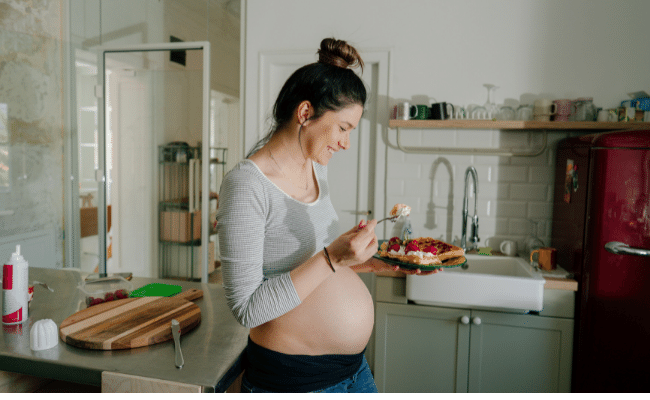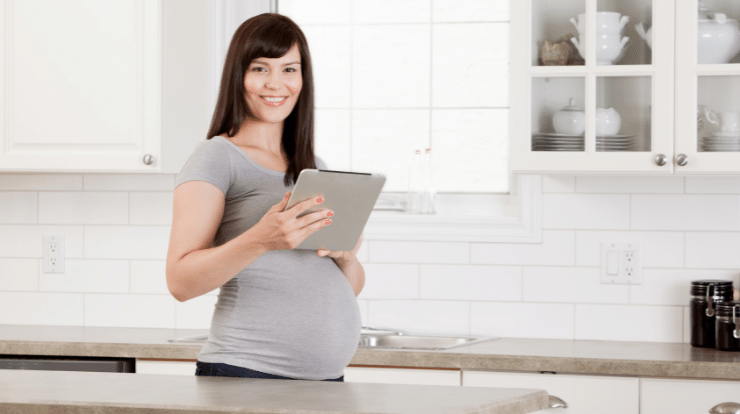
What are pregnancy cravings?
While expecting a baby, expectant mothers often experience food cravings. These are most commonly for sweets and snacks such as ice cream or chocolate, but many women also crave odd things like clay, ashes, and even laundry starch. They may be the body’s way of telling you that you’re lacking certain vitamins and minerals in your diet – or, as is often the case with cravings for non-food items, a way of telling you that your body wants something it cannot properly digest.
Some scientists believe that pregnancy cravings are instinctive behaviors from our early history of gathering plants for food – yet others think they’re simply habits formed from the foods we eat on a regular basis. Whatever the cause, cravings can be controlled with a few tricks to help you get through your pregnancy without eating something crazy!
What are the most common pregnancy cravings?
Cravings are different for everyone, but there are some foods that pregnant women seem particularly drawn towards. Some of the more common ones include:
- Pizza
- Ice cream
- Chocolate
- Chips and salsa
- Pickles
- Bacon
- Coffee
- Tea
Are pregnancy cravings real?
There’s no doubt that pregnancy cravings are real. In fact, many expecting mothers experience them during their pregnancies. Pregnancy cravings can be for anything from sweets to salty foods to strange combinations of foods. While the specific cravings a woman experiences vary from pregnancy to pregnancy, most women will experience at least some cravings during their pregnancies.
Is it ok to give in to pregnancy cravings?
The answer to this question is a resounding yes! Pregnancy cravings are completely normal and should be satisfied whenever possible. In fact, it’s important to satisfy your cravings during pregnancy, as they can provide important nutrients that your baby needs.

How early in pregnancy do you get cravings?
Most women experience pregnancy cravings during the first trimester. However, some women experience cravings throughout their entire pregnancy. It’s common to experience cravings during the first trimester when the body is trying to adjust to the changes occurring in the body. The most common cravings are for sweets and salty foods.
What should you do if you have a craving?
If you’re experiencing a craving, the best thing to do is try to satisfy it in a healthy way. This might mean enjoying a small portion of your favorite food or finding a healthy alternative to satisfy the same need. For example, if you’re craving chocolate, try a dark chocolate bar that has a high percentage of cocoa solids – or have a piece of fruit instead.
If you can’t seem to shake a craving, it’s best to talk to your doctor or midwife about it. They may be able to help you figure out why you’re experiencing the craving and suggest ways to deal with it. Remember, you don’t have to give in to every craving – it’s OK to say no sometimes!
What are some tips for avoiding unhealthy cravings?
If you’re trying to avoid unhealthy cravings, there are a few things you can do:
– Make sure you’re eating a balanced diet with plenty of fruits and vegetables.
– Drink plenty of water and avoid sugary drinks.
– Get regular exercise.
– Make sure you’re getting enough sleep.
– Keep healthy snacks on hand, like fruit, nuts, or hard-boiled eggs.
– Avoid temptation by not keeping unhealthy foods in the house.
Cravings can be frustrating, but with a little willpower, you can usually overcome them. By following these tips, you can keep your cravings under control and stay healthy during your pregnancy.
What causes pregnancy cravings?
There’s no one-size-fits-all answer to this question, as the cause of pregnancy cravings varies from woman to woman. However, some possible causes of pregnancy cravings include:
Hormone fluctuations:
Pregnancy hormones can cause all sorts of changes in your body, including leading to food cravings. Hormonal changes are responsible for many of the known pregnancy symptoms, including morning sickness and swollen breasts.
Increased hunger:
Many women begin to feel hungrier during their pregnancies due to increased blood flow in the pelvic region. This means that your body is receiving more blood, which means it needs more nutrients. Combined with the hormonal changes that can lead to cravings, this can result in strong hunger pangs.
Psychological factors:
It’s not just physical factors that can cause pregnancy cravings. Sometimes, cravings can be triggered by psychological factors such as boredom or stress.
Are periods carving the same as pregnancy cravings?
Increased appetite and food cravings can occur both with PMS and pregnancy, but the cause is different. Pregnant women have many changes in their bodies during their term, but especially hormones like estrogen or progesterone may increase during the early part of pregnancy. This effect on hormones could trigger food cravings that seem to target protein or fat instead of foods high in sugar or carbohydrates depending on if it’s provoked by PMS or pregnancy.
Are pregnancy cravings important?
If you are expecting a baby, then you will know that at some point there will be cravings. Cravings are a part of pregnancy. They are the body’s way of communicating that it needs certain nutrients. Some women crave meat, others crave chocolate, and others crave a lot of other foods. There are a lot of cravings that pregnant women go through and it’s important to know what they mean. Knowing what you are craving will help you make a choice that is best for you and your baby.
Can you ignore pregnancy cravings?
Pregnancy cravings are a common phenomenon. Most of the time, women cannot resist their cravings and end up indulging in their favorite food. But did you know that you can actually induce a craving by focusing on it? There are ways to get your body to crave a certain food, but the process is not easy. First, you need to understand why the food is special to you. Is it because you associate it with a certain person? Or is it because you ate it for a long time?






